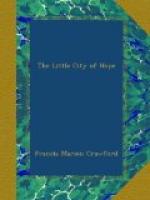But boys of practical minds and sound bodies do not dream at all, unless it be after a feast, and most of them can stand even that without having nightmare, unless two feasts come near together, like Christmas and a birthday within the week.
A great-uncle of mine was once taken for a clergyman at a public dinner nearly a hundred years ago, and he was asked to say grace; he was a good man, and also practical, and had a splendid appetite, but he was not eloquent, and this is what he said:—
“The Lord give us appetites to enjoy, and strength to digest all the good things set before us. Amen!”
And everybody said “Amen” very cheerfully and fell to.
IV
HOW THERE WAS A FAMINE IN THE CITY
It rained in New York and it “snowed slush” in Connecticut, after its manner, and the world was a very dreary place, especially all around the dilapidated cottage where everything was going to pieces, including John Henry Overholt’s last hopes.
If he had been alone in the world he would have taken his small cash balance and his model to the foundry, quite careless as to whether he ever got a meal again until the Motor worked. But there was the boy to be thought of, and desperate as the unhappy inventor was, he would not starve his son as well as himself. He was quite sure of his little balance, though he had never had any head for figures of that sort. It was an easy affair in his eyes to handle the differential calculus, which will do anything, metaphorically speaking, from smashing a rock as flat and thin as a postage stamp, to regulating an astronomical clock; but to understand the complication of a pass-book and a bank account was a matter of the greatest possible difficulty. Newton would have done it much better, though he could not get to the head of his class in arithmetic. That is the difference between being an inventor and having a practical mind. As for Mrs. Overholt, she was perfectly wonderful at keeping accounts; but then she had been taught a great many things, from music and drawing to compound interest and double entry, and she had been taught them all just so far as to be able to do them nicely without understanding at all what she did; which is sound modern education, and no mistake. The object of music is to make a cheerful noise, which can be done very well without pencil and paper and the rules of harmony.
But Overholt could neither make a cheerful noise, nor draw a holly leaf, nor speak French, nor even understand a pass-book, though he had invented an Air-Motor which would not work, but was a clear evidence of genius. The only business idea he had was to make his little balance last as long as possible, in spite of the terrible temptation to take it and offer it to the founder as a cash advance, if only he might have his piece of casting done. Where the rest of the money would come from he did not know; probably out of the Motor. It looked so easy; but there was the boy, and it might happen that there would be no dinner for several days.




